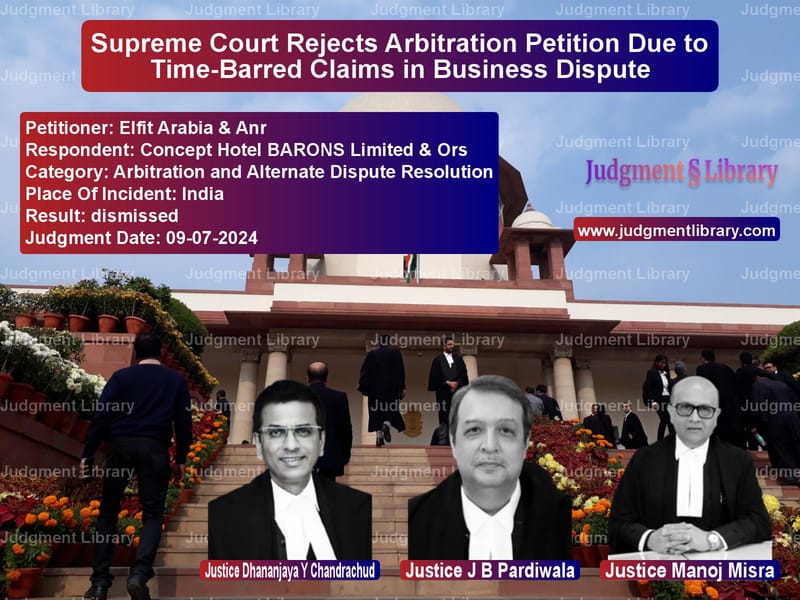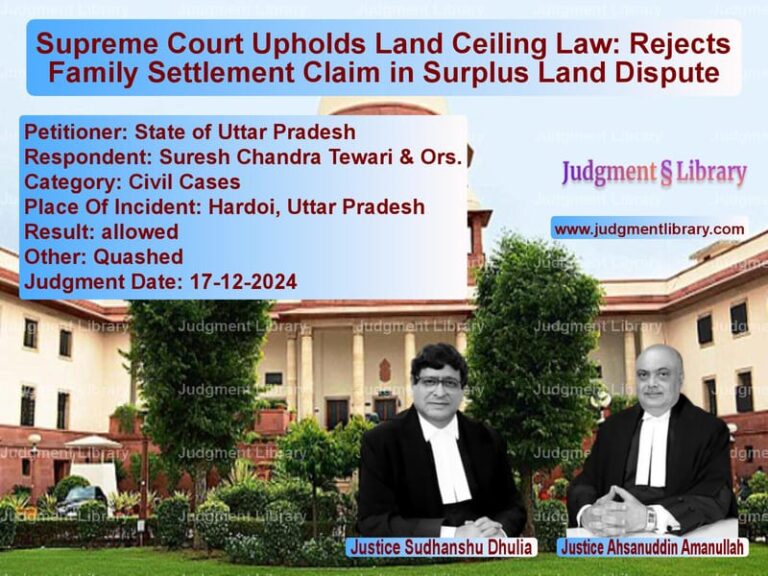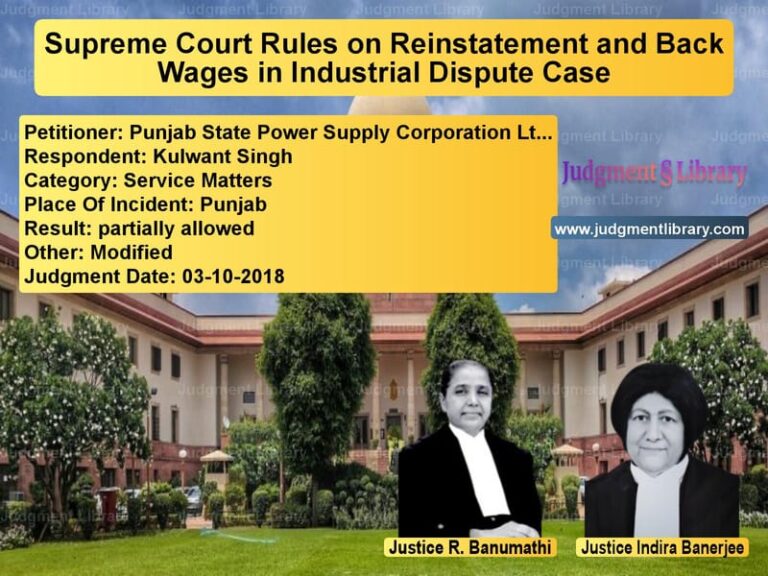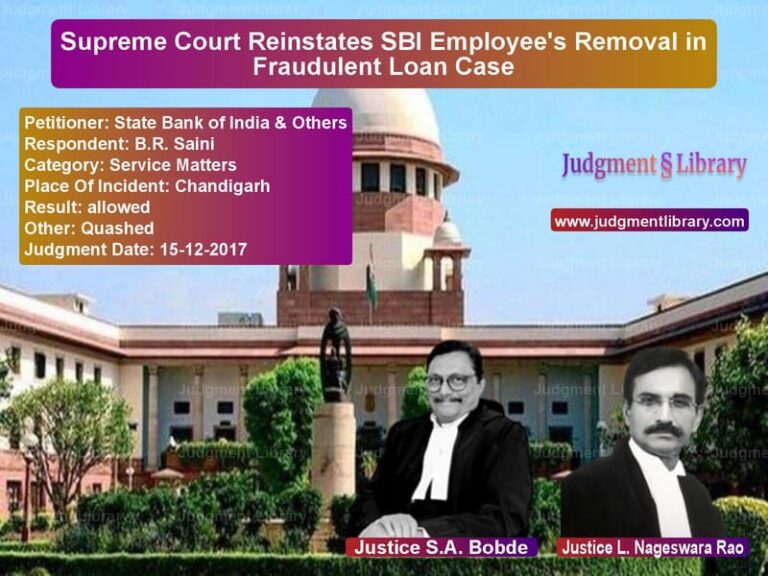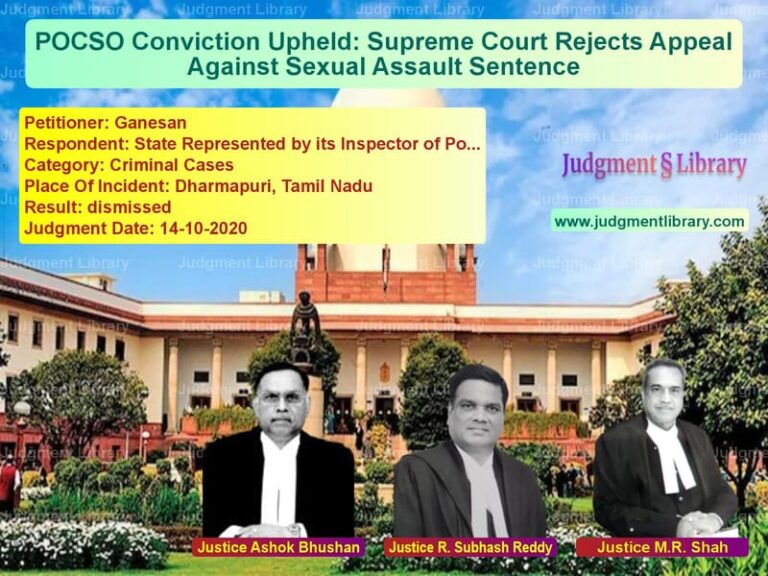Supreme Court Rejects Arbitration Petition Due to Time-Barred Claims in Business Dispute
The case of Elfit Arabia & Anr vs. Concept Hotel BARONS Limited & Ors revolves around a business dispute related to a financial transaction in connection with a telecommunication project. The dispute arose when the petitioners, who had provided financial assistance to the respondents, invoked arbitration eleven years after the cause of action. The Supreme Court rejected the arbitration petition on the ground that the claims were ex-facie time-barred and amounted to ‘deadwood’ litigation.
Background of the Case
The petitioner, a company incorporated in the United Arab Emirates, entered into a Memorandum of Understanding (MoU) with the respondents, which included an Indian company and its directors, to finance a telecommunication project undertaken by Telesuprecon Nigeria Limited (TNL). This agreement was signed on June 1, 2004. Subsequently, a supplementary MoU was executed on August 2, 2006, setting out repayment terms.
According to the petitioners:
- They disbursed funds at various times under the agreement.
- The respondents issued multiple cheques as security for repayment.
- On May 7, 2011, fifteen cheques amounting to ₹7.30 crores were presented for payment but were dishonored.
- On June 2, 2011, a legal notice was issued to enforce the MoU and recover the amount.
Despite these events, the petitioners did not invoke arbitration until July 4, 2022, issuing a fresh notice on October 27, 2022, after receiving no response. When the respondents failed to engage, the petitioners approached the Supreme Court for the appointment of an arbitrator under Section 11(6) of the Arbitration and Conciliation Act, 1996.
Petitioners’ Arguments
The petitioners contended that:
- The respondents had continuously engaged in discussions for repayment, which should be considered a continuing cause of action.
- Proceedings under Section 138 of the Negotiable Instruments Act (for cheque dishonor) were initiated, and an appeal was pending before the Bombay High Court.
- The arbitration clause in the MoU should be enforced despite the delay in invoking arbitration.
- The limitation period should be interpreted in a manner that allows arbitration proceedings to continue.
Respondents’ Arguments
The respondents strongly opposed the arbitration petition, arguing:
- The claims were ex-facie time-barred since arbitration was invoked more than a decade after the cause of action arose in 2011.
- The petitioners had failed to take any steps to enforce arbitration within the statutory limitation period of three years.
- The proceedings under Section 138 of the Negotiable Instruments Act were distinct from arbitration and did not extend the limitation period.
- Allowing arbitration at this stage would amount to forcing the respondents into a protracted and futile legal process.
Supreme Court’s Observations
The Supreme Court extensively examined the limitation aspect, emphasizing the need for judicial scrutiny when claims appear to be barred by time. The Court referred to its precedent in Vidya Drolia v. Durga Trading Corporation, stating:
“Undertaking a detailed full review or a long-drawn review at the referral stage would obstruct and cause delay undermining the integrity and efficacy of arbitration as a dispute resolution mechanism. Conversely, if the court becomes too reluctant to intervene, it may undermine the effectiveness of both arbitration and the court.”
The Court also cited BSNL v. Nortel Networks (India) (P) Ltd. to highlight that the limitation period for initiating arbitration is three years from the date of the cause of action, as per the Limitation Act, 1963.
Key Findings of the Supreme Court
The Supreme Court made the following critical observations:
- The notices invoking arbitration were issued eleven years after the cause of action arose in 2011, well beyond the three-year limitation period prescribed under the Limitation Act.
- The initiation of proceedings under Section 138 of the Negotiable Instruments Act did not create a continuing cause of action for arbitration.
- Arbitration is not meant to be a mechanism to revive claims that are already dead under limitation law.
- Permitting arbitration in this case would amount to compelling the parties to engage in a futile exercise.
Final Verdict
The Supreme Court dismissed the arbitration petition, ruling:
“The claim is ex-facie barred by limitation. The initiation of arbitration at this stage would amount to compelling the parties to arbitrate a ‘deadwood’ claim that is demonstrably time-barred.”
The Court refused to appoint an arbitrator and dismissed the petition, along with any pending applications.
Implications of the Judgment
This ruling sets a critical precedent regarding the enforcement of arbitration clauses and limitation periods. The key takeaways include:
- Timely invocation of arbitration: Parties must initiate arbitration within the statutory period, or risk their claims being dismissed as time-barred.
- Role of courts in arbitration referrals: While courts generally favor arbitration, they will intervene to prevent frivolous or expired claims from proceeding.
- Independence of legal proceedings: Criminal proceedings under Section 138 of the Negotiable Instruments Act do not extend the limitation period for arbitration.
Conclusion
The Supreme Court’s ruling in this case underscores the importance of adhering to limitation laws in arbitration. While arbitration remains a preferred mechanism for resolving disputes, it cannot be misused to revive claims that are legally dead. Businesses and financial entities must ensure that arbitration clauses are invoked in a timely manner to avoid losing their legal rights.
Petitioner Name: Elfit Arabia & Anr.Respondent Name: Concept Hotel BARONS Limited & Ors.Judgment By: Justice Dhananjaya Y Chandrachud, Justice J B Pardiwala, Justice Manoj Misra.Place Of Incident: India.Judgment Date: 09-07-2024.
Don’t miss out on the full details! Download the complete judgment in PDF format below and gain valuable insights instantly!
Download Judgment: elfit-arabia-&-anr-vs-concept-hotel-barons-supreme-court-of-india-judgment-dated-09-07-2024.pdf
Directly Download Judgment: Directly download this Judgment
See all petitions in Arbitration Awards
See all petitions in Dispute Resolution Mechanisms
See all petitions in Contract Disputes
See all petitions in Enforcement of Awards
See all petitions in Settlement Agreements
See all petitions in Judgment by Dhananjaya Y Chandrachud
See all petitions in Judgment by J.B. Pardiwala
See all petitions in Judgment by Manoj Misra
See all petitions in dismissed
See all petitions in supreme court of India judgments July 2024
See all petitions in 2024 judgments
See all posts in Arbitration and Alternate Dispute Resolution Category
See all allowed petitions in Arbitration and Alternate Dispute Resolution Category
See all Dismissed petitions in Arbitration and Alternate Dispute Resolution Category
See all partially allowed petitions in Arbitration and Alternate Dispute Resolution Category

